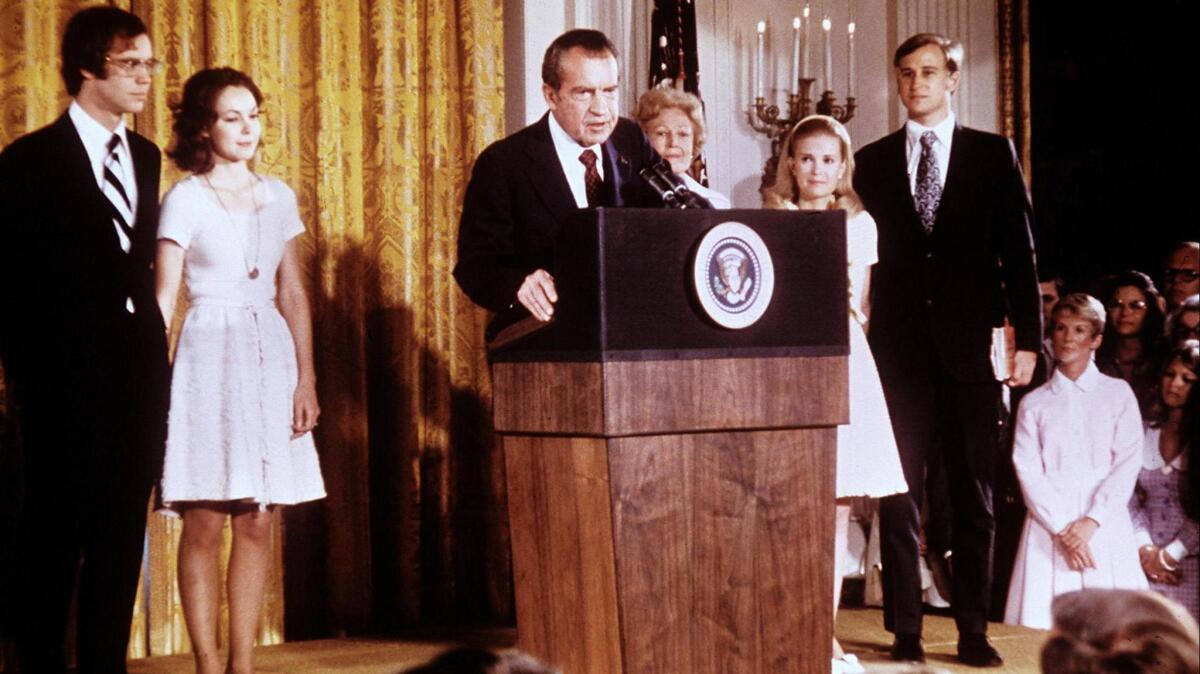Op-Ed: The end of Nixon’s presidency proves Pelosi is wrong to wait on impeachment

In my diary of the last six weeks of the Nixon presidency, there’s an entry for July 23, 1974. That was the day before the televised hearings on three impeachment articles against President Nixon were to begin, and there was high anticipation of what would happen. I had gone to the House of Representatives to seek out a progressive Republican congressman from Wisconsin, William Steiger. The press, he complained, “is always looking for a political or self-serving motive for our votes.” Reporters were not paying enough attention to the conscience of individual congressmen, as they approached a historic vote.
Within an hour of that encounter, I sat in a packed news conference listening to another Republican, Rep. Lawrence Hogan of Maryland (the father of the current governor of Maryland and potential challenger for President Trump in 2020) as he stepped forward to be the first member of his party on the House Judiciary Committee to confirm that he would be voting for impeachment.
“This is an occasion when party loyalty demands too much,” the elder Hogan said. “To base this decision on politics would not only violate my conscience but it would be a breach of my oath to uphold the Constitution. Those who oppose impeachment say it would weaken the presidency. In my view, if we do not impeach this president after all he has done, we would be weakening the presidency even more.”
Voting, in public, with history in the balance, concentrates the mind and the conscience; investigations alone do not.
Three days later, five more of the 17 Republican members of the Judiciary Committee followed Hogan to vote for the first of the articles of impeachment, alleging that Nixon obstructed justice in the the Watergate cover-up.
It is these acts of conscience and courage that history remembers, just as history forgets the other 11 Republicans of the committee who marched slavishly to the party line. Five other notable Republicans were pivotal to the dynamic of those final days. After the so-called smoking gun tape was revealed, Rep. Charles Wiggins of Los Angeles, who had been the president’s fiercest defender in the Judiciary Committee proceedings, felt a keen sense of betrayal and announced that he would vote for removal. And the anguish of William Cohen of Maine, later President Clinton’s Republican secretary of Defense, was palpable.
“I have been faced,” he said in his opening statement the day of the committee vote, “with the terrible responsibility of assessing the conduct of a president that I voted for, believed to be the best man to lead this country, who has made significant and lasting contributions toward securing peace in this country, throughout the world, but a president who in the process by active acquiescence allowed the rule of law and the Constitution to slip under the boots of indifference and arrogance and abuse.”
Three other Republicans, Sen. Barry Goldwater, Sen. Hugh Scott and House Minority Leader John Rhodes, were critical in persuading a wavering Nixon not to drag the country through an impeachment trial in the Senate. They went to the White House on what would become the day before the president’s resignation not to demand that Nixon leave office, but simply to “assess” with him his bleak situation.
What happened in Washington in the summer of 1974 is a template for what could and perhaps should happen in the summer of 2019. The behavior of Republicans back then holds important lessons for the current situation. Hogan and his like-minded colleagues did not step forward at the outset of the impeachment process, but only at the very end, when historic votes loomed, votes that would force upon them the most profound personal consideration about what they valued and what they stood for.
Yet today’s House leader, Nancy Pelosi, and her group are demanding that Republicans step forward now, at a preliminary stage in judging President Trump, as a condition of proceeding with impeachment. No formal process should even be initiated, she says, without significant Republican buy-in. This position is untenable. It forecloses the possibility, strange as it may seem to some, that there are decent and thoughtful Republicans who are deeply troubled by the revelations of the Mueller report, but who would come forward only when they were forced to do so because of a vote to decide the president’s fate.
Enter the Fray: First takes on the news of the minute »
The investigate, investigate, investigate strategy lets both Republicans and Democrats off the hook. The point of oversight should be to come to conclusions about presidential misconduct, and then do something about it. Only specific articles of impeachment allow for that. Voting, in public, with history in the balance, concentrates the mind and the conscience; investigations alone do not.
Just as investigating endlessly without conclusion lets politicians off the hook, so is it an abrogation of responsibility to lob the scandal of the Trump presidency over to the court system. Time is now of the essence. Waiting for weeks and even months for the courts to deliberate and decide questions of obstruction and abuse of power ensures that impeachment will die by October. In the fall, the nation will be turning its attention to the 2020 election with the Iowa caucuses only a few months away.
Impeachment hearings must get underway before the August recess of Congress. After that, forget about it. Trump will have won. No collusion, no obstruction will be the mantra of the land by fiat.
James Reston Jr. is the author of, among other books, “The Conviction of Richard Nixon: The Untold Story of the Frost/Nixon Interviews.”
Follow the Opinion section on Twitter @latimesopinionand Facebook
More to Read
A cure for the common opinion
Get thought-provoking perspectives with our weekly newsletter.
You may occasionally receive promotional content from the Los Angeles Times.










